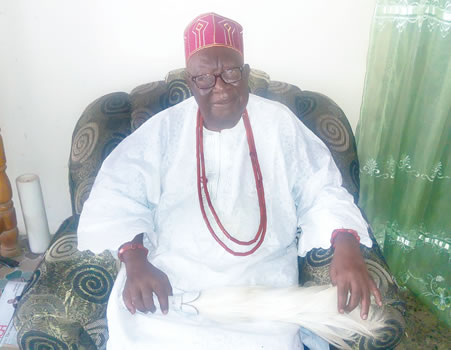How did you emerge as the Iralepo and how many obas reigned before you?
We have 36 kings before me, I am the 37th Iralepo. I was elected among many others by the kingmakers and I was installed on the July 3, 1978. The king before me, Oba Aladetoyinbo died in 1976. In 1977, they voted for me and led me to the shrine for the necessary rites in 1978 and made me their king. Before I became king in 1978, there was a commission put in place known as Morgan Commission. It was the commission that promoted all the village heads then but Iralepo of Isinkan and Osolo were left out because we had no representation due to the interregnum here at that period. That was how some community heads became traditional rulers of their communities
What were you doing before becoming an Oba?
I trained as a dispensary attendant at the General Hospital in Akure. The hospital was established in 1953 and I was one of the pioneer officers of the hospital after moving the old hospital to its present place. I was the Chief Store Officer of the hospital, because I also attended a school in Ikeja, Lagos where I was trained as a medical store officer before joining the establishment. I also serve at Ilesha as a Medical Store Officer before moving to Akure. But I opted out of the service in 1978, when I was selected as the traditional ruler of Isinkan.
With almost 40 years on the throne, how has your reign impacted your community?
I must thank God for the journey so far. The first thing is the church, we have allowed churches to grow in Isinkan while many of our people have embraced Christianity and I can tell you that God has been controlling the affairs of this land. Apart from that, the number of schools here has increased; both secondary and primary schools. During the tenure of Governor Mimiko, he built modern markets for us here in Isinkan, our women usually stay in the sun and rain before now, but things have changed. When churches grow, schools are increasing and the markets are there, we have more people coming to build houses and industries in the land. From Danjuma area to Oke Ogba, to the old Police headquarters, we have witnessed so many developments. Most of our roads are now motorable, we have good roads and we are looking forward to the government to provide some basic amenities and infrastructure for our people to make life more comfortable for them.
Again, as part of efforts to develop the land, we are planning to hold the maiden Isikan Day where our sons and daughters, both home and abroad will come home to celebrate the land and contribute their own quota to the development of Isikan. We have our sons and daughters across the globe and we are making efforts to get in touch with them to celebrate this land. We shall celebrate this land very soon.
There are things government alone cannot do, we want to see what our people can do for the people at home, in terms of sponsoring the education of our people, scholarship for young and indigent students, establishing industries to create employment opportunities, support agriculture, especially to revive cocoa farming and also to assist the town in development of this land.
How did Isinkan come into being?
We are grandchildren of Oduduwa, Akanbi was our father, when other Princes were trying to find their kingdoms, Ora the son of Oluiroko left Ile Ife and during the course of his journey, he got to a place known as Epe, near Ondo town, it was a kingdom in those days, and met some other princes, but left Epe to found our own kingdom, they have to trek until they got to Owena and stayed there for a few days because of the river. It was not easy to cross rivers in those days but we later moved and settled at where we referred to as the Broadcast village in Ondo today, that’s where we settled down and called it Oke Isinkan, that was our cradle, we settled there for while. It was there that Asodeboyede came to meet us. Asodeboyede said he traced the smoke to the place and found out that those who stayed there were his blood brothers, referring to Ora as his senior brother and they hugged themselves because they were cousins, and we have been living peacefully ever since then. Then we took to farming and there was a boundary between us and the Akure people. There is a place we call Imogun now, it was Akure land and all the annual ceremonies done in Akure end there; that was not part of Isinkan. But the Deji of Akure, as we know it later is the paramount ruler, but we have a traditional ruler in Isinkan, so also in Isolo, we have our own different people with distinct culture and tradition. There is mutual respect between the Deji of Akure, the Iralepo of Isinkan and Osolo. We accord respect to Deji as the paramount ruler of Akureland.
So, the Isinkan people came here before the Akure people?
Yes, that is correct, they met our forefathers here because after our forefathers had settled down at Oke Isinkan, Asodeboyede came there to meet his cousins by tracing the smoke from a fire. I once asked from one of the Dejis, Oba Adelegan Adesida, who is like my father why Akure people refer to Isinkan people as Egbon in his palace and he explained that Okanbi, the first son of Oduduwa begat Oluiroko and Oluiroko begat Ora, and that he is the first son which is why they refer to his lineage as Egbon after their original father. But all along, the Deji has been the paramount ruler of Akure land, we accord him a great respect while the British made him the head of the Native Court of Appeal and Iralepo and Osolo as members. Isinkan people had been here, Ora led them here, the son of Oluiroko. While Oluiroko died at Epe, his son, Ora left Epe with the paraphernalia of the king which included the beaded crown and other things and founded this place.
Going by this history, there used to be cordial relationship, what went wrong?
Yes, we have been living together in peace as brothers and sisters but one Deji was installed who felt Isikan and Isolo should be colonized. He planned to make the stool of Iralepo a chieftaincy title under him, he wanted to co-opt the Iralepo and Osolo to become part of the kingmakers known as Iwarefa in Akure, but we resisted it because we maintained that we are not part of Akure and we have our different and separate customs and tradition. We instituted a court case against this action, because Iralepo or Osolo had never been a chief in Akure before, we are three distinct communities with distinct customs and traditions and living together for more than 500 years, and we wondered how we will be made a Chief in Akure. All these happened during the reign of Oba Adebobajo Adesida and we were in the court for a long time before the court ruled that we are traditional rulers of our respective domain. As soon we have the court judgment during the reign of governor Olusegun Agagu, we were given the staff of office but later another Deji who felt that judgment was not pleasant to him, went to appeal the judgment, the late Deji, Adebiyi Adesida approached the Court of Appeal again and later the Supreme Court, that’s why we are still in court today. But the administration in the state put in place a Chieftaincy Review Commission, because he knew that some communities were being cheated, that commission is known as Ajama Chieftaincy Commission. We appeared before the Commission to establish our case and we are still waiting for the result of the commission.
What is the relationship between you and the new Deji of Akure?
Let me start by commending the new Deji of Akureland, Oba Aladetoyinbo, he is a man of peace and very accommodating. Immediately he was installed as the Deji of Akureland, I sent my Chiefs to the palace as a mark of respect to him and our people were well received. He confirmed to my people that both Iralepo and Osolo are traditional rulers of their people according to what was related to him by his father. I personally visited the Deji’s palace to salute him and we have been according him the respect he deserves as the traditional ruler of Akure, I honour and respect him as the paramount ruler of Akureland, and he also gives us the deserved respect. We all see Deji as our father, there’s nothing wrong to work hand in hand with him, for development to come to this land.





